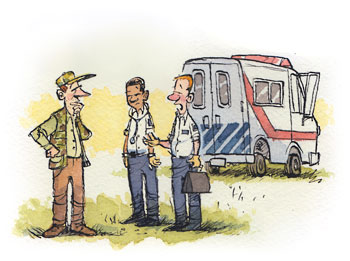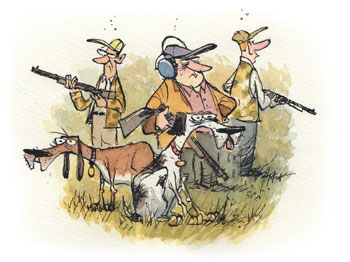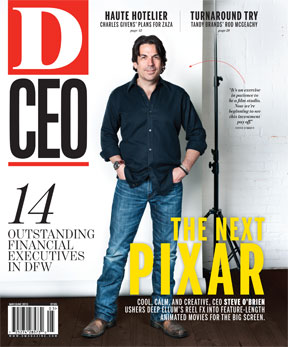With just three of us left in the field, I dropped back a few yards behind the bench and quickly shot birds that would fall in front of Big Man for his limit.
He loved those shells.
I cannot emphasize how rare it is for us to find ourselves in uncomplimentary hunting circumstances and, when this does occur, I understand why. The head man has always done it his way and trusted his instincts in the asphalt jungles. So why would the same thing not work out here? Well, sometimes it just doesn’t.
Over the years, I have had several guys tell me that they were going to kick my ass. I have also pulled guys aside privately (never in public), refunded their money, and sent them home. Once I was sent on a rescue mission to retrieve a client who, according the guide who left him, was “in a catatonic trance and holding a pistol on the dashboard.” (Mr. Comatose turned out to be okay.)
Even dealing with 300 or 400 clients per year, the number of transgressions is amazingly few—especially among bird hunters. I have been incredibly lucky in traveling to foreign countries with clients and have made lifelong friends with some of the classiest sportsmen and women on the globe.

I once took several clients to hunt big game with a very dear overseas partner of mine who particularly luuuuuved Texans. But … uh, not this particular Texan I brought into camp. After more than a few instances of drunken and disrespectable behavior, my partner began this conversation:
“How much does Mr. X still owe us?”
“About $18,000,” I offered.
“Well then,” he said standing up. “If you feel like you need to go across that table and just bash him, don’t let my half of the money stop you.”
Killer Bees and Quicksand
Once a fella has chosen to wear the uniform of jeans and a camo shirt 100 times a year, as I have, he’s pretty much made it known that he has also chosen not to deal with your company’s bureaucracy. Sure, I will send in the W-9 form, tend to special dietary needs as best I can. Glad to meet your private plane pretty much anywhere.
But other than a simple invoice, don’t expect much more from me in the way of paperwork. Tell me how many are coming, and I will send you some sample menus and itineraries—maybe a waiver template. You send me how many folks and a check. Oh, I almost forgot one other thing: I really don’t want to communicate with your “girl” 60 times before the hunt. We know what we are doing.
Which bring us every so often to the guy who does not.
Forever etched in my mind is a conversation I had with the CEO of a small oil company. I told him, “Go over here and stand by that tree. The birds will come this way.” He must have thought I said: “There are killer bees and quicksand under that tree.” Because he did a 180 pivot away from the flight pattern. The good news was that the oilman’s best client stood nearby, and I gave him the honey spot that proved a real barrel-melter.
This is not to say that I am right all the time, and that difficult clients are forever empty-headed. Frankly I have learned as much on the front porches of my lodges on subjects like setting decoys and tracking deer as I have in the field. Oftentimes, one of my CEO clients will begin a conversation with, “Have you ever thought about trying … ?” And, by golly, the strategy will work.
The worst trip I ever guided came about because I did not use my usual Doubting Thomas theory. I had pheasant-hunted lots of land near Greensburg, Kan., but needed more because I had a North Texas CEO and a group from his office flying in the company plane to meet me for an opening-day hunt there.
The clean, warm accommodations in the farmer’s giant basement were perfect. The incredible comfort food was on the table when I arrived with my No. 1 scout and pronounced, “We have a great spot to hunt tomorrow. It is opening day, so everybody be ready early.”
“You see any birds there?” someone shouted.
“No, but they have to be there,” I promised.

The mayor and the magistrate in town were friends, as was the newspaper man I phoned. He said to calm down, “Ol’ Butch” would come to my rescue. We just needed to meet him in an hour at the truckstop, pay up, and wait for him to work his magic. Ol’ Butch, I imagined, would recommend that we hunt the fields a certain way, or tell us the pheasants “hang out over there,” say. I am just going to cut this story waaaaay short and tell you that, for the day, we moved about one bird an hour—none in range—while “Ol’ Butch” sat in his truck and read a book.
We did not do much better the next day. Thankfully my quarterback client, the CEO of a monstrous manufacturing plant, was classy all the way. He even generously tipped the guides, saying, “I know you worked your tails off. The birds just were not cooperating.” Believe it or not this gentlemen has even hunted with me several times since the Kansas catastrophe.
An entrepreneur or CEO or business founder has a mind that just operates differently. They do not get where they are by choking down to hit every ball down the middle of the fairway. I “get that” and understand that, like me, they are often unemployable by pretty much anybody else.
It’s what makes life interesting.
Like today when Phil, my pal from Atlanta, called to say he was sending me all sorts of bungee cords, canvas, metal stakes, and 4x4s, so we can assemble and test the latest iteration of what he calls a “pheasant launcher.”
Phil has a real successful real estate company there in Georgia, where he’s the CEO.





